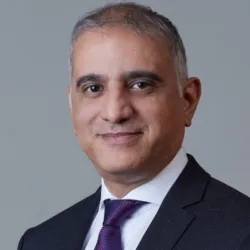Suptech: disruptive technologies in reporting, regulation and supervision
Suptech: disruptive technologies in reporting, regulation and supervision
Suptech: disruptive technologies in reporting, regulation and supervision
Date: September 26–28, 2023
Time: 9am-12pm (EDT) | 2pm-5pm (BST) | 3pm - 6pm (CET) I 9pm-12am (SGT)
Location: Virtual

Klaus Löber
Chair, CCP supervisory committee
European Securities and Markets Authority (ESMA)
Klaus Löber is the Chair of the CCP Supervisory Committee (CCP SC) in ESMA, which was established in 2020. His areas of responsibility encompass the tasks attributed by the European Market Infrastructure Regulation (EMIR) to the CCP SC, in particular the enhanced supervisory convergence towards EU CCPs and ensuring a resilient CCP landscape in the EU as well the monitoring and supervision of CCPs established in third countries in view of the risks that they may pose to the EU financial system. He is also chairing the ESMA CCP Policy Committee contributing to the EU Single Rule Book in the area of CCPs.
Prior to this role, Mr Löber was the Head of the Oversight Division of the European Central Bank in charge of the oversight of financial market infrastructures, payments instruments and schemes. Earlier positions include the Head of the Secretariat of the Committee on Payments and Market Infrastructures, the global standard setting body in the area of payments, clearing and settlement as well as positions in the European Commission, Deutsche Bundesbank and private practice.
Mr Löber regularly publishes on financial markets legal, regulatory and infrastructure issues and lectures at universities.

Douglas Arner
Kerry Holdings professor in law
University of Hong Kong
Douglas W. Arner is the Kerry Holdings Professor in Law, RGC Senior Fellow in Digital Finance and Sustainable Development and Associate Director of the HKU-Standard Chartered Foundation FinTech Academy at the University of Hong Kong. In addition, he is Associate Dean (Taught Postgraduate and Development) of the Faculty of Law at HKU and co-founder and former Director of HKU’s Asian Institute of International Financial Law, as well as Faculty Director and co-founder of the LLM in Compliance and Regulation, the LLM in Corporate and Financial Law, the Law, Innovation, Technology and Entrepreneurship (LITE), and the East Asian International Economic Law and Policy Programmes. Douglas served as Head of the HKU Department of Law from 2011-2014, as Director of the Duke University-HKU Asia America Institute in Transnational Law from 2005-2016, and as an inaugural member of the Hong Kong Financial Services Development Council from 2013-2019. He is a Visiting Professor and Senior Visiting Fellow of Melbourne Law School of the University of Melbourne, a Visiting Professorial Fellow of the Faculty of Law of UNSW Sydney, a non-executive director of NASDAQ and Euronext listed biotechnology firm Aptorum Group, an Advisory Board Member of the Global Impact FinTech (GIFT) Forum, Policy 4.0 and of the Centre for Finance, Technology and Entrepreneurship (CFTE), and co-founder and an executive board member of the Asia Pacific Structured Finance Association. In 2020 he was awarded an inaugural Hong Kong Research Grants Council Senior Fellowship to study the role of digital finance in financial inclusion and the UN Sustainable Development Goals. Douglas has published eighteen books and more than 200 articles, chapters and reports on international financial law and regulation, including most recently Reconceptualising Global Finance and its Regulation (Cambridge 2016) (with Ross Buckley and Emilios Avgouleas) and The RegTech Book (Wiley 2019 (Janos Barberis and Ross Buckley). His recent papers are available on SSRN at https://papers.ssrn.com/sol3/cf_dev/AbsByAuth.cfm?per_id=524849 , where he is among the top 50 authors in the world by total downloads, as well as among the top 15 law authors. Douglas led the development of Introduction to FinTech – launched with edX in May 2018 and now with over 100,000 learners spanning almost every country in the world – and the foundation of the edx-HKU Online Professional Certificate in FinTech. In addition, he has served as a consultant with, among others, the World Bank, Asian Development Bank, UN, APEC, Alliance for Financial Inclusion, and European Bank for Reconstruction and Development. He has lectured, co-organised conferences and seminars and been involved with financial sector reform projects around the world. Douglas has been a visiting professor or fellow at Duke, Harvard, the Hong Kong Institute for Monetary Research, IDC Herzliya, McGill, Melbourne, National University of Singapore, University of New South Wales, Shanghai University of Finance and Economics, and Zurich, among others.

Ramūnas Baravykas
Advisor to the executive director, supervision service
Bank of Lithuania
Project manager of Risk-based Supervision Model Implementation into the Supervisory Activities project;
Under my leadership, an e-Licensing tool was developed, which allows FIs to submit applications electronically and allows automated application evaluation by including the necessary expertise and information on issued licenses to be submitted to the LIS system of the Center of Registers and the Lietuvos bankas website.
Under my leadership, the Supervision Service information system ProTas was developed and implemented. IT tools supporting business processes were implemented: the Register of Sanctions, the Register of Inspections, the Register of Consumer Disputes and Complaints and tools to support settlement process, dispute submission via electronic channels.
Head of Risk Modelling Division, 2012–2015
Quantitative models of selection and risk assessment were implemented.
INSURANCE SUPERVISORY COMMISSION OF THE REPUBLIC OF LITHUANIA
Deputy Chair, 2008–2012
At the same time – European Insurance and Occupational Pensions Authority (EIOPA) (Member of Board of Supervisors; Financial Stability Committee; Information Technology and Data Committee); European Systemic Risk Board (ESRB) (General Board; Special Advisory Committee); Nordic-Baltic Stability Group (NBSG).
Head of Information Analysis, 2006–2008
Actuary, 2004–2006

Amanah Ramadiah
Data scientist
FNA
Amanah is a Data Scientist at FNA and serves as the primary client-facing Data Scientist in the Asia-Pacific region. She is the lead data scientist developing and delivering FNA’s agent-based CBDC Simulator to central banks and financial institutions. She holds a Ph.D. in Computational Finance from University College London. Her main research interest is systemic risk, with a particular focus on the application of complex networks to the study of financial stability. Prior to joining FNA, she was affiliated with the Bank of England and the International Monetary Fund.

Patrick Papsdorf
Head of payments oversight
European Central Bank
Patrick Papsdorf is Head of Section of Payments Oversight in the Directorate General Payments and Market Infrastructure (DG-MIP) at the European Central Bank (ECB). His area of responsibility comprises the oversight of payment systems and schemes, and encompasses the assessment of emerging risks and developments in the payments ecosystem, including aspects cyber resilience and financial innovation. Prior to this, Mr Papsdorf was Adviser to DG-MIP's Market Infrastructure Management Division, where he was in charge of analytical and compliance matters, and contributed to the operations and development of key market infrastructures.
Earlier positions include a commercial bank, the Deutsche Bundesbank and the Federal Reserve Bank of New York. Mr Papsdorf holds the German recognition as bank officer, a bachelor's degree in business management from the University of the Deutsche Bundesbank and a master in global management.

Adeyemi Omotoso
Policy specialist - inclusive fintech
Alliance for Financial Inclusion
Adeyemi is a digital financial services, financial technology, and digital innovation enthusiast. He actively supports over 80 financial regulators and central banks on policy and regulatory priorities covering FinTech innovation regulation, supervision and ecosystem strategy, open finance, innovative digital financial services & retail payments, regulatory sandbox, payment systems, digital identity and e-KYC, responsible digital credit, electronic money regulation, regulatory and supervisory technologies and recently, digital currencies including central bank digital currency opportunities for financial inclusion, in his current role leading the Inclusive FinTech workstream at the Alliance for Financial Inclusion.
He has over 15 years professional experience working in payment processing, switching, core banking applications, digital banking channels, micro-insurance, micro-pensions, digital credit, micro-savings, cardless ATM services, mobile money, mobile banking, DFS product design across a spectrum of market segments, across Africa and a few markets in Asia.
He holds an engineering degree in Petroleum and Gas Engineering, advanced degree in managerial psychology and a MBA.

Lukasz Kubicki
Head of the supervision technology section
European Central Bank
Lukasz Kubicki is the head of the supervision technology section at the European Central Bank. His team is responsible for driving the implementation of cutting-edge technologies across the ECB Banking Supervision. Lukasz joined the SSM in 2015 and since then he has led a number of SSM-wide projects and initiatives. Before, he has also worked in McKinsey&Co managing engagements in the area of strategy and digitalisation in the banking sector.

Salih Gonullu
Adviser and principal architect
BIS Innovation Hub Switzerland
Salih transformed FX market monitoring for Central Banks using innovation and profound market insights. Boasting an expansive career of 23 years, Salih is a well-grounded, solution-oriented Computer Engineer with an impeccable knack for seamlessly blending technology and finance.
With vast experience as a software and system engineer, Salih's fervour for embracing new technologies is unequivocal. Since 2015, Salih laid significant technological foundations at the Swiss National Bank, serving as an architect, to advance the digital modernisation strategy.
Joining the BIS Innovation Hub in 2019, Salih's vision took shape in the form of a transformative project that sought to redefine FX market monitoring. As the technical lead of this endeavour, Salih spearheaded the creation of a state-of-theart FX monitoring platform and dashboard, harnessing cutting edge streaming technology. This ambitious project was borne out of a singular mission: to bolster central banks' insights into the FX market, enabling them to excel in their mandates.

Leo Gosland
Senior manager - advanced analytics
FCA
Driving the application of data science, machine learning and artificial intelligence within the FCA.
Over 20 years of hands-on technical and commercial experience, leading the delivery of analytics and technology programmes in the financial services industry across the UK, Europe and Asia.
Agenda
14:00 – 14:15
Suptech 2023: course introduction and welcome
Course introduction session led by the chair
14:00 - 14:15
- Introductions and welcome from the chairperson
- Overview of the training course
- Discussion of the participant expectations
Klaus Löber is the Chair of the CCP Supervisory Committee (CCP SC) in ESMA, which was established in 2020. His areas of responsibility encompass the tasks attributed by the European Market Infrastructure Regulation (EMIR) to the CCP SC, in particular the enhanced supervisory convergence towards EU CCPs and ensuring a resilient CCP landscape in the EU as well the monitoring and supervision of CCPs established in third countries in view of the risks that they may pose to the EU financial system. He is also chairing the ESMA CCP Policy Committee contributing to the EU Single Rule Book in the area of CCPs.
Prior to this role, Mr Löber was the Head of the Oversight Division of the European Central Bank in charge of the oversight of financial market infrastructures, payments instruments and schemes. Earlier positions include the Head of the Secretariat of the Committee on Payments and Market Infrastructures, the global standard setting body in the area of payments, clearing and settlement as well as positions in the European Commission, Deutsche Bundesbank and private practice.
Mr Löber regularly publishes on financial markets legal, regulatory and infrastructure issues and lectures at universities.
14:15 – 15:15
The foundations of regtech and suptech
14:15 - 15:15
- Evolutionary journey of financial, regulatory, and supervisory technology
- How has regtech and suptech impacted the financial services industry?
- Identifying key technologies in the areas of DLT, big data analytics, machine learning and cloud computing
- Examples of applications in regulatory reporting and compliance risk management
Douglas W. Arner is the Kerry Holdings Professor in Law, RGC Senior Fellow in Digital Finance and Sustainable Development and Associate Director of the HKU-Standard Chartered Foundation FinTech Academy at the University of Hong Kong. In addition, he is Associate Dean (Taught Postgraduate and Development) of the Faculty of Law at HKU and co-founder and former Director of HKU’s Asian Institute of International Financial Law, as well as Faculty Director and co-founder of the LLM in Compliance and Regulation, the LLM in Corporate and Financial Law, the Law, Innovation, Technology and Entrepreneurship (LITE), and the East Asian International Economic Law and Policy Programmes. Douglas served as Head of the HKU Department of Law from 2011-2014, as Director of the Duke University-HKU Asia America Institute in Transnational Law from 2005-2016, and as an inaugural member of the Hong Kong Financial Services Development Council from 2013-2019. In 2020 he was awarded an inaugural Hong Kong Research Grants Council Senior Fellowship to study the role of digital finance in financial inclusion and the UN Sustainable Development Goals. Douglas is a Visiting Professor and Senior Visiting Fellow of Melbourne Law School of the University of Melbourne, a Visiting Professorial Fellow of the Faculty of Law of UNSW Sydney, a non-executive director of NASDAQ and Euronext listed biotechnology firm Aptorum Group, an Advisory Board Member of the Global Impact FinTech (GIFT) Forum, Policy 4.0 and of the Centre for Finance, Technology and Entrepreneurship (CFTE), and co-founder and an executive board member of the Asia Pacific Structured Finance Association. Douglas has published eighteen books and more than 200 articles, chapters and reports on international financial law and regulation, including most recently Reconceptualising Global Finance and its Regulation (Cambridge 2016) (with Ross Buckley and Emilios Avgouleas) and The RegTech Book (Wiley 2019 (Janos Barberis and Ross Buckley). His recent papers are available on SSRN at https://papers.ssrn.com/sol3/cf_dev/AbsByAuth.cfm?per_id=524849 , where he is among the top 50 authors in the world and among the top 15 authors in the area of law by total downloads. Douglas led the development of Introduction to FinTech – launched with edX in May 2018 and now with over 100,000 learners spanning almost every country in the world – and the foundation of the edx-HKU Online Professional Certificate in FinTech. In addition, he has served as a consultant with, among others, the World Bank, Asian Development Bank, UN, APEC, Alliance for Financial Inclusion, and European Bank for Reconstruction and Development. He has lectured, co-organised conferences and seminars and been involved with financial sector reform projects around the world. Douglas has been a visiting professor or fellow at Duke, Harvard, the Hong Kong Institute for Monetary Research, IDC Herzliya, McGill, Melbourne, National University of Singapore, University of New South Wales, Shanghai University of Finance and Economics, and Zurich, among others.Douglas W. Arner is the Kerry Holdings Professor in Law, RGC Senior Fellow in Digital Finance and Sustainable Development and Associate Director of the HKU-Standard Chartered Foundation FinTech Academy at the University of Hong Kong. In addition, he is Associate Dean (Taught Postgraduate and Development) of the Faculty of Law at HKU and co-founder and former Director of HKU’s Asian Institute of International Financial Law, as well as Faculty Director and co-founder of the LLM in Compliance and Regulation, the LLM in Corporate and Financial Law, the Law, Innovation, Technology and Entrepreneurship (LITE), and the East Asian International Economic Law and Policy Programmes. Douglas served as Head of the HKU Department of Law from 2011-2014, as Director of the Duke University-HKU Asia America Institute in Transnational Law from 2005-2016, and as an inaugural member of the Hong Kong Financial Services Development Council from 2013-2019. In 2020 he was awarded an inaugural Hong Kong Research Grants Council Senior Fellowship to study the role of digital finance in financial inclusion and the UN Sustainable Development Goals. Douglas is a Visiting Professor and Senior Visiting Fellow of Melbourne Law School of the University of Melbourne, a Visiting Professorial Fellow of the Faculty of Law of UNSW Sydney, a non-executive director of NASDAQ and Euronext listed biotechnology firm Aptorum Group, an Advisory Board Member of the Global Impact FinTech (GIFT) Forum, Policy 4.0 and of the Centre for Finance, Technology and Entrepreneurship (CFTE), and co-founder and an executive board member of the Asia Pacific Structured Finance Association. Douglas has published eighteen books and more than 200 articles, chapters and reports on international financial law and regulation, including most recently Reconceptualising Global Finance and its Regulation (Cambridge 2016) (with Ross Buckley and Emilios Avgouleas) and The RegTech Book (Wiley 2019 (Janos Barberis and Ross Buckley). His recent papers are available on SSRN at https://papers.ssrn.com/sol3/cf_dev/AbsByAuth.cfm?per_id=524849 , where he is among the top 50 authors in the world and among the top 15 authors in the area of law by total downloads. Douglas led the development of Introduction to FinTech – launched with edX in May 2018 and now with over 100,000 learners spanning almost every country in the world – and the foundation of the edx-HKU Online Professional Certificate in FinTech. In addition, he has served as a consultant with, among others, the World Bank, Asian Development Bank, UN, APEC, Alliance for Financial Inclusion, and European Bank for Reconstruction and Development. He has lectured, co-organised conferences and seminars and been involved with financial sector reform projects around the world. Douglas has been a visiting professor or fellow at Duke, Harvard, the Hong Kong Institute for Monetary Research, IDC Herzliya, McGill, Melbourne, National University of Singapore, University of New South Wales, Shanghai University of Finance and Economics, and Zurich, among others.
15:15 – 16:15
Fintech: implications and opportunities for central banks
15:15 - 16:15
- Overview of key fintech applications
- Essential traits of successful frameworks for the supervision of technological innovation
- The potential impact and opportunities for central banks and their institutional structure
- The collaboration and alignment between central banks and the private sector
Project manager of Risk-based Supervision Model Implementation into the Supervisory Activities project;
Under my leadership, an e-Licensing tool was developed, which allows FIs to submit applications electronically and allows automated application evaluation by including the necessary expertise and information on issued licenses to be submitted to the LIS system of the Center of Registers and the Lietuvos bankas website.
Under my leadership, the Supervision Service information system ProTas was developed and implemented. IT tools supporting business processes were implemented: the Register of Sanctions, the Register of Inspections, the Register of Consumer Disputes and Complaints and tools to support settlement process, dispute submission via electronic channels.
Head of Risk Modelling Division, 2012–2015
Quantitative models of selection and risk assessment were implemented.
INSURANCE SUPERVISORY COMMISSION OF THE REPUBLIC OF LITHUANIA
Deputy Chair, 2008–2012
At the same time – European Insurance and Occupational Pensions Authority (EIOPA) (Member of Board of Supervisors; Financial Stability Committee; Information Technology and Data Committee); European Systemic Risk Board (ESRB) (General Board; Special Advisory Committee); Nordic-Baltic Stability Group (NBSG).
Head of Information Analysis, 2006–2008
Actuary, 2004–2006
16:15 – 17:00
Oversight of fintech's: challenges and risks
15:00 - 16:00
- The role of central banks in the fintech ecosystem
- How to frame an oversight framework capable of capturing the activities of fintech's
- Increasing international cooperation between banking supervisors and relevant authorities
- Lessons learnt and practices for interactions with fintech's
- Identifying areas of outsourcing and related risks and concerns
Patrick Papsdorf is Head of Section of Payments Oversight in the Directorate General Payments and Market Infrastructure (DG-MIP) at the European Central Bank (ECB). His area of responsibility comprises the oversight of payment systems and schemes, and encompasses the assessment of emerging risks and developments in the payments ecosystem, including aspects cyber resilience and financial innovation. Prior to this, Mr Papsdorf was Adviser to DG-MIP's Market Infrastructure Management Division, where he was in charge of analytical and compliance matters, and contributed to the operations and development of key market infrastructures.
Earlier positions include a commercial bank, the Deutsche Bundesbank and the Federal Reserve Bank of New York. Mr Papsdorf holds the German recognition as bank officer, a bachelor's degree in business management from the University of the Deutsche Bundesbank and a master in global management.
14:00 – 15:00
Suptech in payments and how the utilization of alternative data can facilitate risk analysis
14:00 - 15:00
- Overview of key trends and development within suptech analytics
- Examples of alternative & payments da–a - and their integration into supervisory and risk analysis
- Tips for successfully combining proprietary data with publicly available datasets
- Case studies and practical demonstrations
Amanah is a Data Scientist at FNA and serves as the primary client-facing Data Scientist in the Asia-Pacific region. She is the lead data scientist developing and delivering FNA’s agent-based CBDC Simulator to central banks and financial institutions. She holds a Ph.D. in Computational Finance from University College London. Her main research interest is systemic risk, with a particular focus on the application of complex networks to the study of financial stability. Prior to joining FNA, she was affiliated with the Bank of England and the International Monetary Fund.
15:00 – 16:00
Project Rio: real-time market insight for central banks
15:00 - 16:00
- Using new tools to monitor markets
- Utilising streaming technology to meet central bank challenges
- Live demo of Rio project
Salih transformed FX market monitoring for Central Banks using innovation and profound market insights. Boasting an expansive career of 23 years, Salih is a well-grounded, solution-oriented Computer Engineer with an impeccable knack for seamlessly blending technology and finance.
With vast experience as a software and system engineer, Salih's fervour for embracing new technologies is unequivocal. Since 2015, Salih laid significant technological foundations at the Swiss National Bank, serving as an architect, to advance the digital modernisation strategy.
Joining the BIS Innovation Hub in 2019, Salih's vision took shape in the form of a transformative project that sought to redefine FX market monitoring. As the technical lead of this endeavour, Salih spearheaded the creation of a state-of-theart FX monitoring platform and dashboard, harnessing cutting edge streaming technology. This ambitious project was borne out of a singular mission: to bolster central banks' insights into the FX market, enabling them to excel in their mandates.
16:00 – 17:00
Regtech and suptech in supporting emerging countries
16:00 - 17:00
- How can the use of regulatory and supervisory technologies promote financial inclusion, stability, and efficiency in developing economies?
- Using technology to streamline regulatory processes, enhance risk management capabilities, and improve access to financial services for underserved populations
- What must emerging countries do to attract investment, boost economic growth, and integrate into the global financial system?
Adeyemi is a digital financial services, financial technology, and digital innovation enthusiast. He actively supports over 80 financial regulators and central banks on policy and regulatory priorities covering FinTech innovation regulation, supervision and ecosystem strategy, open finance, innovative digital financial services & retail payments, regulatory sandbox, payment systems, digital identity and e-KYC, responsible digital credit, electronic money regulation, regulatory and supervisory technologies and recently, digital currencies including central bank digital currency opportunities for financial inclusion, in his current role leading the Inclusive FinTech workstream at the Alliance for Financial Inclusion.
He has over 15 years professional experience working in payment processing, switching, core banking applications, digital banking channels, micro-insurance, micro-pensions, digital credit, micro-savings, cardless ATM services, mobile money, mobile banking, DFS product design across a spectrum of market segments, across Africa and a few markets in Asia.
He holds an engineering degree in Petroleum and Gas Engineering, advanced degree in managerial psychology and a MBA.
14:00 – 15:00
Fighting financial crime with data and analytics
14:00 - 15:00
- An overview of the FCAs Financial Crime Analytics programme including recent work on Sanctions Screening and Anti Money Laundering
Driving the application of data science, machine learning and artificial intelligence within the FCA.
Over 20 years of hands-on technical and commercial experience, leading the delivery of analytics and technology programmes in the financial services industry across the UK, Europe and Asia.
15:00 – 16:00
Data-driven supervision
16:15 - 17:00
- What is Data-driven supervision? And how can it enhance the efficiency and effectiveness of a central bank's supervisory activities?
- How do you collect, analyse, and interpret large amounts of data to identify patterns, trends, and potential risks in the financial system?
- How can Data-driven supervision promote financial stability?
Lukasz Kubicki is the head of the supervision technology section at the European Central Bank. His team is responsible for driving the implementation of cutting-edge technologies across the ECB Banking Supervision. Lukasz joined the SSM in 2015 and since then he has led a number of SSM-wide projects and initiatives. Before, he has also worked in McKinsey&Co managing engagements in the area of strategy and digitalisation in the banking sector.
16:00 – 17:00
Suptech: interactive workshop and closing remarks
16:00 - 17:00
- Summary of the course
- Discussion of the observed trends and case studies
- Group workshop – what learning points can you apply in your organisation?
- Preparation of action points
Klaus Löber is the Chair of the CCP Supervisory Committee (CCP SC) in ESMA, which was established in 2020. His areas of responsibility encompass the tasks attributed by the European Market Infrastructure Regulation (EMIR) to the CCP SC, in particular the enhanced supervisory convergence towards EU CCPs and ensuring a resilient CCP landscape in the EU as well the monitoring and supervision of CCPs established in third countries in view of the risks that they may pose to the EU financial system. He is also chairing the ESMA CCP Policy Committee contributing to the EU Single Rule Book in the area of CCPs.
Prior to this role, Mr Löber was the Head of the Oversight Division of the European Central Bank in charge of the oversight of financial market infrastructures, payments instruments and schemes. Earlier positions include the Head of the Secretariat of the Committee on Payments and Market Infrastructures, the global standard setting body in the area of payments, clearing and settlement as well as positions in the European Commission, Deutsche Bundesbank and private practice.
Mr Löber regularly publishes on financial markets legal, regulatory and infrastructure issues and lectures at universities.
Two weeks prior to your training course you will be given access to course materials. There will be a combination of articles, reports and presentations that will contribute to two hours of preparation time for the live content. Presentations for the sessions will also be held here subject to the speaker approval.
Learning outcomes
At the end of the course participants will be able to:
- Understand of the impact of technological advancements on financial markets and regulatory landscape
- Analyse the implications of digital assets and cryptocurrencies on regulators and supervisors
- Develop strategies for mitigating the risks of cyber threats to the financial system
- Explore the opportunities and challenges of the digitalization of financial services
- Understand the potential of advanced technologies such as machine readability, big data, and artificial intelligence for regulatory and supervisory purposes
